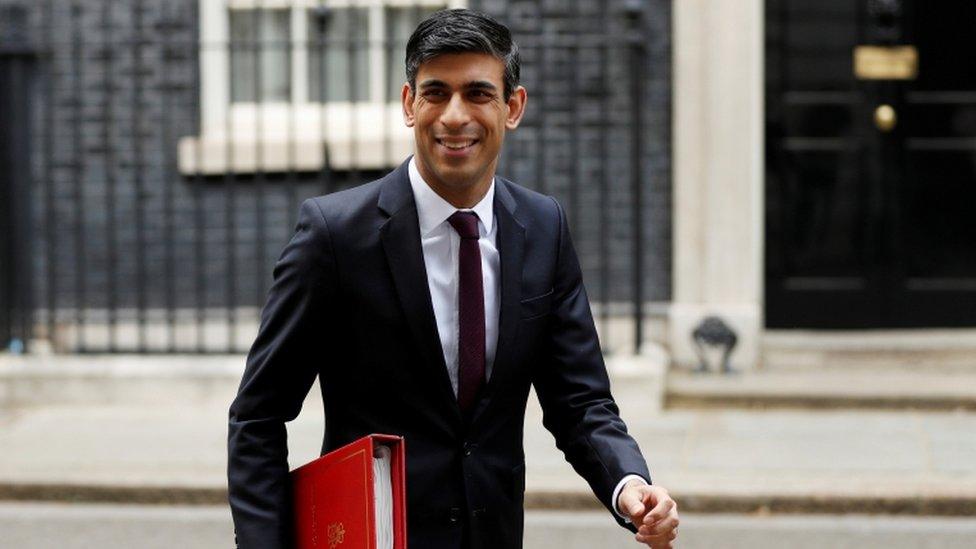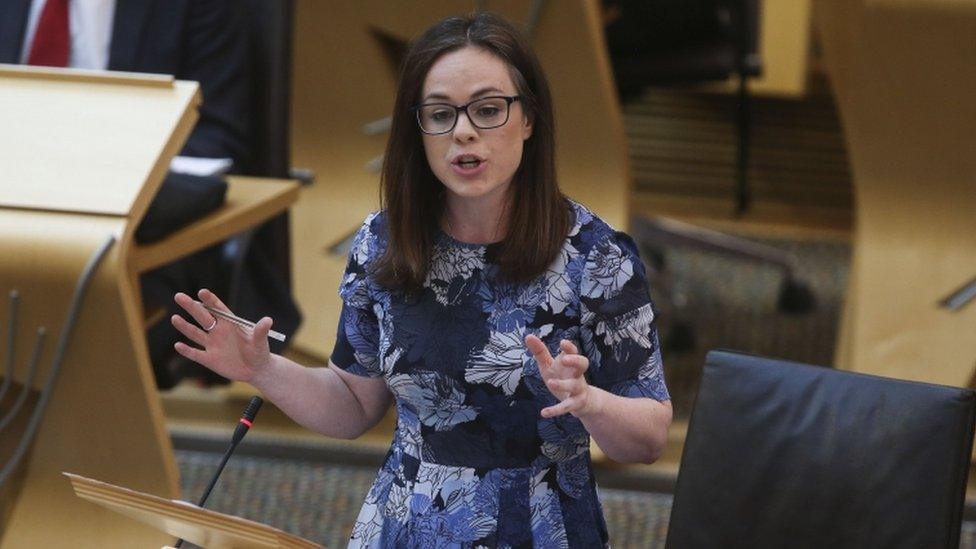Coronavirus in Scotland: Kate and Rishi’s giant splurge gun
- Published

The Chancellor will need to heavily revise his budget later this year
Huge extra spending and lower tax revenue will require big mid-year revisions to Westminster and Holyrood budgets, with capital spending a big area for change.
New funds keep flowing from the Treasury, creating tensions over how they are distributed within Scotland, and how much can be drawnfrom existing Holyrood budgets.
The payment of grants to smaller and medium-sized businesses is slowing up and over-complex, complains the trade body - and only half the budget has been paid out so far.
It's two months since a budget was passed by the Scottish Parliament, its timetable delayed by Brexit and the Westminster election. On the same day, Rishi Sunak delivered his first Budget at Westminster, four weeks into his new job as Chancellor.
It was also on 11 March that the World Health Organisation declared a pandemic had spread out of China.
What a difference two months makes.
Back then, Mr Sunak found £7bn to ease the looming demands on firms, households and welfare, and a further £5bn contingency for the health service.
It seemed quite a lot at the time, while it was clear that more would be required. But few could foresee how much more.
Between a precipitous drop in tax revenue and a humongous boost to spending, the Office for Budget Responsibliity (OBR) is now estimating a budget deficit this year of £275bn.
The government's policy decisions alone have added £99bn to spending and cut £4bn from tax, said the OBR in updating its estimates on 30 April. To that, add extra benefit claims and much less revenue.
'Storm in a teacup'

Finance Secretary Kate Forbes wants the rules around furlough to be relaxed
That means the two 11 March budgets - Westminster and Holyrood - will have to be heavily revised mid-year.
That much became clear this week, with an update from Scotland's finance secretary Kate Forbes. So let's see how much things have changed for Holyrood.
Getting a handle on the total is a fast-moving target. Every week, there are additions to the funding made available to businesses, individuals and households.
(At the very point this article was being published, another £45m was added, as if by magic, to double the size of a fund for something called "pivotal enterprise resilience". It was overwhelmed by applications and had to shut down earlier this week while Scottish Enterprise sought to define what is vulnerable and what is vital.)
The Scottish government has put at least £2.3bn into grants for business, and support schemes for individuals. That has flowed from the Barnett consequentials: the amount that is distributed to Scotland, Wales and Northern Ireland when new money is found in Whitehall for services in England.
Much of it has flowed from the Scottish government into councils. It could be accounted for as a transfer payment, but the administrative handling of such money is itself an extra cost for councils.
The big financial row that erupted in the past week is how Ms Forbes is to use an additional £155m that resulted from £1.7bn extra allocated to councils in England.
Under pressure from both Conservative and Labour MSPs, she confirmed what was likely anyway - that it would go through councils. The controversy, or what she called "a storm in a teacup", was which councils get what.
There's been a long-standing arrangement to distribute funds to 32 councils through a formula based on a combination of need and tax base. The finance secretary is revising that to look how need may have changed. Her critics don't like the sound of what that might mean.
Last weekend, Mr Sunak found a further wadge of funds to plug some of the gaps in the schemes he had already got under way. This was perhaps confusing for Scots, for whom such a fund, of £100m, had already been set up.
That was using £43m that was taken from existing budgets, as legislated on 11 March. But as of last weekend, there is now a further £60m to put towards that, leaving a handy £17m left over, which ministers have said will also go to business.
Then comes £100m from Whitehall to head off growing concern in universities that there are gaping holes in their budgets. That sum was for research, and doesn't get anywhere close to the gaps left by departed foreign students and low applications for next year.
The Scottish government followed up with £75m for Scottish university research. This, I'm told, is from capital budgets, recognising that the lockdown of much of the economy has meant a lot of capital spending will not now go ahead as planned. Some projects will either be knocked into next financial year, or cancelled. That's what the mid-year budget will have to address.
Who pays?
The really big costs are not being paid out through Holyrood. They include the furlough payments, channelled through a reversal of the PAYE tax pipeline for employed people.
Likewise, it is HM Revenue and Customs doing the numbers for self-employed people. They should be getting funds calculated on the basis of their tax returns over the past three years, though that leaves some of the significant gaps now being plugged.
And that raises a tricky financial and constitutional question: if it is now accepted (and it is) that devolved administrations can carry on with lockdown for longer than Whitehall chooses to do, then who pays, and how much, towards the continued cost of furlough and other income support schemes?
Nobody's saying for now, and not for want of daily questions to the first minister by journalists. However, a letter went from St Andrew's House on Thursday to the Chancellor, making it clear that there's an expectation such extra Scottish costs will be met, because Holyrood does not have sufficient powers to borrow on its own account.
The letter, from Ms Forbes and economy secretary Fiona Hyslop, also called for a more relaxed set of rules on furlough, allowing for furloughed employees to do at least some work for their employer, and for the furlough scheme to be continued longer for some sectors that will need it longer. Hospitality is one obvious candidate.
Wind down
Such requests come ahead of the announcement Rishi Sunak will have to make about the future of the furlough scheme after its scheduled end in June. He's promised there won't be "a cliff-edge", but he's been preparing the ground for a wind-down of it.
The Bank of England's report, on Thursday, sent a clear signal that whatever wind-down there is will have to be co-ordinated with the wind-down of social distancing restrictions. It reckons that business will only pick up when the health-related restrictions are eased, and until that happens there's a big risk that furloughed workers will quickly become redundant ones.
ICAS, the Scottish accountant's body, made clear how its members see the end of furlough. If it's to be at the end of June, then redundancy consultations for some bigger employers, with no cash to pay wages, will have to start on 10 May. For employers with fewer than 100 staff, the consultation would have to start on 31 May.
The human resources body, the Chartered Institute of Personnel Development, estimated this week that more than 350,000 Scots currently on furlough would otherwise be redundant.
Meanwhile, back in Scotland, there's a stickiness about the distribution of those business grants for smaller and medium-scale enterprises (SMEs). If your rateable value is under £18,000, you don't pay any business rates. And that makes your firm eligible for a £10,000 business interruption grant.
But if you don't pay business rates, you may not have done everything you should have done to keep your ratepayer registration up to date. In some cases, we're told the "named ratepayer" has left the company, or even died. And in at least some council areas, that disqualifies you from getting the grant.
Some companies aren't direct payers of business rates, but pay them via landlords - in shared offices, for instance. They may not be eligible either.
Those issues have been raised by the Federation of Small Businesses in Scotland, noting that the pay-out of these loans, which was already backlogged, has slowed up.
Some £1.2bn has been set aside for the grants scheme in Scotland, but only half of that has been distributed so far, points out the FSB. Last week, £95m was distributed. The week before, it was £139m.
The response from the Scottish government emphasises how much money it is pushing out to business. On the question of how effectively that happens: "The administration of grants is undertaken by local authorities and we continue to work closely with them to ensure that the funding is delivered to eligible businesses as quickly as possible."
One of the next questions is whether that £10,000, and a £25,000 grant for mid-sized hospitality and retail firms, is going to be enough as the length of the lockdown extends into summer. This splurge is a long way from ending.
